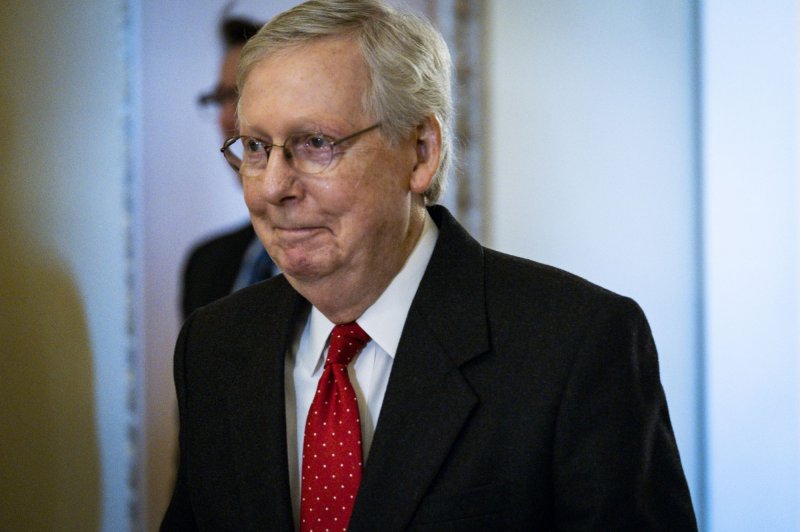1 of 7 | Senate Majority Leader Mitch McConnell, R-Ky., makes his way to the Senate chamber in the Capitol as the impeachment trial of President Donald Trump begins on Tuesday. Photo by Pete Marovich/UPI |
License Photo
Jan. 21 (UPI) -- The Senate passed a resolution early Wednesday to set the rules for the impeachment trial of President Donald Trump after hours of contentious debate that saw Republicans thwart all attempts by the Democrats to subpoena witnesses.
The resolution was adopted in a party line vote of 53-47 after more than 12 hours of debate that began Tuesday but was dragged into the early hours of Wednesday when Senate Republican leader Mitch McConnell of Kentucky finally adjourned.
Each of the 11 amendments Democrats proposed seeking subpoenas for documents, records and witness testimony, among other rules and regulations, were shot down 53-47.
Under the resolution passed, House managers and White House attorneys will open their arguments Wednesday afternoon. Each will have 24 hours to make their cases for or against impeachment over three days, up from two as McConnell had originally proposed.
Following that, senators will have 16 hours to ask questions in writing that will be read by Chief Justice John G. Roberts for the appropriate side to answer.
Trump is charged with abuse of power and obstruction of justice in connection to his interactions with Ukraine last year.
The Senate began the trial of Trump on Tuesday with McConnell introducing a resolution to establish rules for the proceedings.
McConnell then quietly increased the time each side will have for opening arguments from 24 hours over the course of two days to three. The language of the resolution also changed the rules on evidence, allowing evidence to be admitted unless there's a vote otherwise.
Senate Democratic leader Chuck Schumer of New York cheered the alterations in a brief statement, claiming McConnell's shift signaled that Republican senators were beginning to see "how unfair" his trial rules are.
White House counsel Pat Cipollone opened the discussion, offering support for McConnell's resolution and saying Trump has done nothing wrong.
"We support this resolution. It is a fair way to proceed with this trial," Cipollone said. "It is long past time to start this proceeding, and we are here today to do it."
Rep. Adam Schiff, D-Calif., one of the Democratic managers from the House, urged the Senate to allow senators to call witnesses and conduct a "fair trial."
"Why should this trial be different than any other trial? The short answer is it shouldn't. But leader McConnell's resolution would turn the trial process on its head," he said.
As the proceedings dragged on, the debates turned acrimonious with Democrats lashing out at Republicans, accusing them of participating in a coverup after the GOP voted down several of their amendments seeking documents and testimony from witnesses.
The Democrats were seeking testimony from former and present White House staff Mick Mulvaney, his aide Robert Blair, Office of Management and Budget official Michael Duffey and former national security adviser John Bolton.
House Judiciary Committee Chairman Jerry Nadler chastised the Republicans, stating that if they don't vote in favor of hearing testimony from Bolton then they will be "voting for a coverup."
"Will this Senate do its duty and hear all the evidence, or will it slam this door shut and show it is participating in a coverup?" he asked.
Cipollone then demanded Nadler apologize to Trump, his family, the Senate and the American people before Roberts admonished both sides "in equal terms to remember they are addressing the world's greatest deliberative body."
McConnell has said he will seek to have the trial follow the same structure as that of former President Bill Clinton's in 1999, but his outline indicated Republicans want to fast-track the proceedings.
Democrats criticized the plan, with Schumer saying it's an attempt to "conceal" Trump's misconduct "in the dark of night" -- and Schiff calling it a "rigged" trial process.
"I do think by structuring the trial this way it furthers our case that what's going on here ... is a coverup," said Schiff, who serves as chairman of the House intelligence committee.
"It's clear Sen. McConnell is hell-bent on making it much more difficult to get witnesses and documents and intent on rushing the trial through," Schumer said. "On something as important as impeachment, Sen. McConnell's resolution is nothing short of a national disgrace."
House Speaker Nancy Pelosi held onto the articles of impeachment for three weeks in an effort to secure assurances the trial would be fair. Democrats said they want the trial to include key administration witnesses and new evidence that has emerged since the House impeached Trump in mid-December.
The trial will go six days a week, from Monday through Saturday beginning at 1 p.m.
Trump was in Switzerland on Tuesday, where he spoke at the World Economic Forum.















